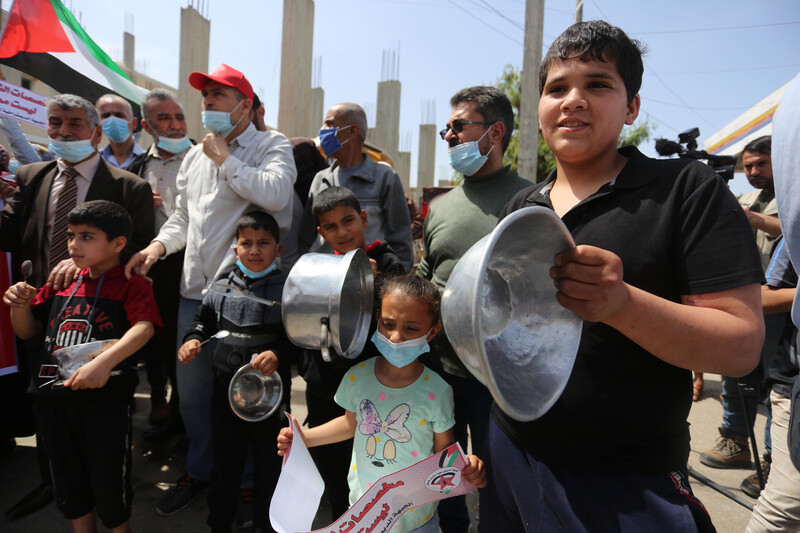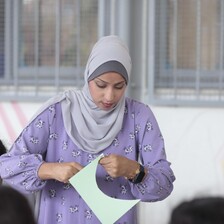The Electronic Intifada 7 May 2021

Protests have been held in Gaza against delays to social welfare payments.
APA imagesEvery month Husam al-Salti has to tell his landlord that he has no money.
Al-Salti will have to use his next social welfare check to pay rental arrears. Otherwise, he and his family risk being evicted from the house where they live in the Khan Younis area of Gaza.
His problems are compounded by an uncertainty as to when the next check will arrive.
Unemployed and with seven children to support, al-Salti relies on an allowance from the Palestinian Authority. He is supposed to receive $550 every three months through the allowance.
Blaming financial difficulties, the PA has not paid the latest allowance due to approximately 80,000 families in Gaza.
“Constantly waiting”
“I am trying to find a job,” said al-Salti, 35. “But there is no work in Gaza. We are under a blockade that has deprived us of our right to work.”
“That is why we are forced to accept social welfare payments,” he added. “The small sum that we get is gone in an instant. After paying rent, there is nothing left. I have to go into debt so that I can get food. I am constantly waiting for my [social welfare] check.”
Osama Jamal, 37, is another father of seven living in Khan Younis.
As he has chronic heart problems, Jamal needs the social welfare check to buy medicine.
“When the check is delayed, the debts I have to pay at the pharmacy get higher,” he said.
“This problem gets worse and worse every year. The Palestinian Authority cannot properly fund its social welfare program. The small sums that we get only cover the most basic necessities – and sometimes not even that.”
The delays have occurred amid the COVID-19 pandemic and a long-imposed siege, both of which have worsened social and economic conditions in Gaza.
The Palestinian Central Bureau of Statistics has calculated that unemployment in Gaza rose from 45 percent in 2019 to 47 percent last year. In some parts of Gaza – such as Deir al-Balah and Rafah – unemployment rates of more than 50 percent have been recorded.
“I want to die”
The Palestinian Authority is headquartered in the occupied West Bank city of Ramallah. A spokesperson for its finance ministry said that no date has been set for when the allowance will be paid.
The spokesperson nonetheless added that “we are working hard to have it paid before Eid al-Fitr,” the Muslim holiday which begins at sundown on 12 May this year.
“We know that the corona pandemic has severely affected people and led to higher unemployment and poverty,” the spokesperson stated. “But the finance ministry does not have the budget we need for spending commitments. This is due to a lack of funding.”
The Palestinian Authority is largely dependent on international aid.
Fadel al-Muzaini from the Palestinian Centre for Human Rights argued that paying social welfare allowances should be a top priority.
“The Palestinian Authority needs to stop using the financial crisis it faces as a justifaction for delaying social welfare payments,” al-Muzaini added.
“The delays are pushing families into more and more precarious situations. These families will be unable to survive if they become even poorer.”
The latest delays follow moves taken by the PA during 2019, when it halted social welfare payments to 2,500 families in Gaza.
Samira Sadiq, 54, was among those who stopped receiving welfare checks. The PA cited the fact she had set up a small shop – which sold potato chips and biscuits – as the reason.
Widowed for about 10 years, she has to support five children and five grandchildren.
“My house is like a beehive – constantly buzzing with all these people crammed into a small space,” she said.
“The social welfare payments I was getting were not enough to meet our basic needs, so I thought about opening a small shop,” Sadiq added.
“But that was not a good idea. The authorities noticed and cut our welfare payments because I was now earning a few shekels a day – to buy food for all these children.”
Sadiq closed the shop last year.
She has reapplied for social welfare assistance. So far the PA has not accepted her application.
“I am living in extreme poverty,” she said. “Every day I feel like I want to die. I cannot cope with seeing hungry children and not being able to provide enough food for them.”
Ruwaida Amer is a journalist based in Gaza.





